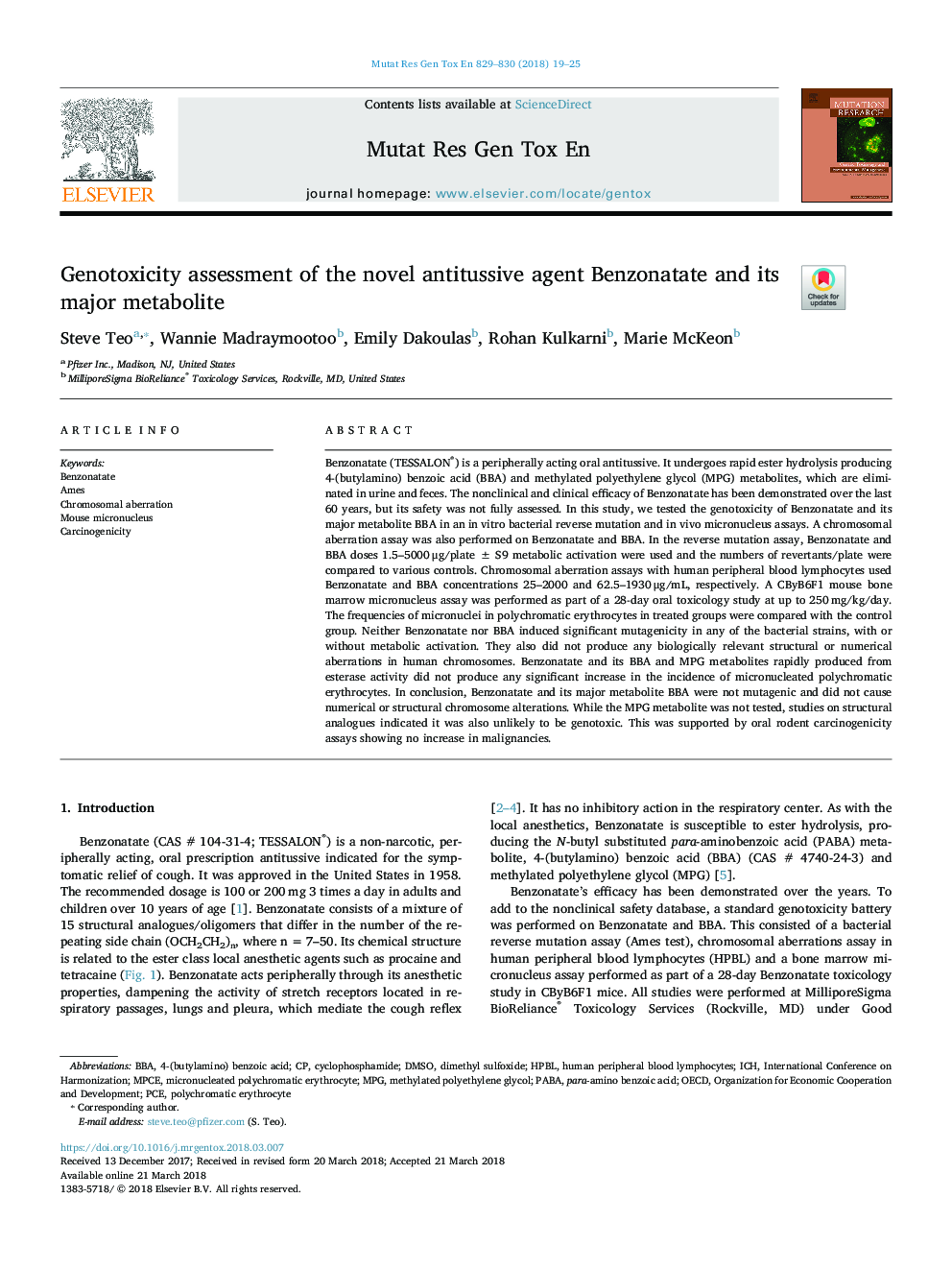| کد مقاله | کد نشریه | سال انتشار | مقاله انگلیسی | نسخه تمام متن |
|---|---|---|---|---|
| 8456200 | 1548542 | 2018 | 7 صفحه PDF | دانلود رایگان |
عنوان انگلیسی مقاله ISI
Genotoxicity assessment of the novel antitussive agent Benzonatate and its major metabolite
ترجمه فارسی عنوان
ارزیابی ژنتیک زیستی عامل بنزناتات عامل ضد سرطان جدید و متابولیت اصلی آن
دانلود مقاله + سفارش ترجمه
دانلود مقاله ISI انگلیسی
رایگان برای ایرانیان
کلمات کلیدی
PCEmicronucleated polychromatic erythrocyteOECDBBAHPBLMPGMPCEDMSO - DMSOpolychromatic erythrocyte - اریتروسیت چند رنگیAmes - امزChromosomal aberration - انحراف کروموزومیBenzonatate - بنزناتاتDimethyl sulfoxide - دیمتیل سولفواکسیدOrganization for Economic Cooperation and Development - سازمان همکاری های اقتصادی و توسعهCarcinogenicity - سرطان زاییCyclophosphamide - سیکلوفسفامید Human peripheral blood lymphocytes - لنفوسیت های خون محیطی انسانICH - منMouse micronucleus - میکروسکوپ موشPABA - پاباInternational Conference on Harmonization - کنفرانس بین المللی هماهنگی
موضوعات مرتبط
علوم زیستی و بیوفناوری
بیوشیمی، ژنتیک و زیست شناسی مولکولی
تحقیقات سرطان
چکیده انگلیسی
Benzonatate (TESSALON®) is a peripherally acting oral antitussive. It undergoes rapid ester hydrolysis producing 4-(butylamino) benzoic acid (BBA) and methylated polyethylene glycol (MPG) metabolites, which are eliminated in urine and feces. The nonclinical and clinical efficacy of Benzonatate has been demonstrated over the last 60 years, but its safety was not fully assessed. In this study, we tested the genotoxicity of Benzonatate and its major metabolite BBA in an in vitro bacterial reverse mutation and in vivo micronucleus assays. A chromosomal aberration assay was also performed on Benzonatate and BBA. In the reverse mutation assay, Benzonatate and BBA doses 1.5-5000â¯Î¼g/plateâ¯Â±â¯S9 metabolic activation were used and the numbers of revertants/plate were compared to various controls. Chromosomal aberration assays with human peripheral blood lymphocytes used Benzonatate and BBA concentrations 25-2000 and 62.5-1930â¯Î¼g/mL, respectively. A CByB6F1 mouse bone marrow micronucleus assay was performed as part of a 28-day oral toxicology study at up to 250â¯mg/kg/day. The frequencies of micronuclei in polychromatic erythrocytes in treated groups were compared with the control group. Neither Benzonatate nor BBA induced significant mutagenicity in any of the bacterial strains, with or without metabolic activation. They also did not produce any biologically relevant structural or numerical aberrations in human chromosomes. Benzonatate and its BBA and MPG metabolites rapidly produced from esterase activity did not produce any significant increase in the incidence of micronucleated polychromatic erythrocytes. In conclusion, Benzonatate and its major metabolite BBA were not mutagenic and did not cause numerical or structural chromosome alterations. While the MPG metabolite was not tested, studies on structural analogues indicated it was also unlikely to be genotoxic. This was supported by oral rodent carcinogenicity assays showing no increase in malignancies.
ناشر
Database: Elsevier - ScienceDirect (ساینس دایرکت)
Journal: Mutation Research/Genetic Toxicology and Environmental Mutagenesis - Volumes 829â830, MayâJune 2018, Pages 19-25
Journal: Mutation Research/Genetic Toxicology and Environmental Mutagenesis - Volumes 829â830, MayâJune 2018, Pages 19-25
نویسندگان
Steve Teo, Wannie Madraymootoo, Emily Dakoulas, Rohan Kulkarni, Marie McKeon,
